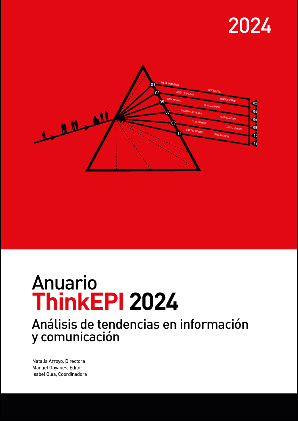Public libraries and social action: trends of a decade (2013-2023)
DOI:
https://doi.org/10.3145/thinkepi.2024.e18a37Keywords:
Social role of libraries, María Moliner Award, Seal of Consejo de Cooperación BibliotecariaAbstract
The social function of libraries encompasses actions aimed both at society as a whole and at specific groups at risk of exclusion. This work is reflected in the projects that libraries submit to the two most recognized professional awards: the María Moliner Awards and the Seal of Consejo de Cooperación Bibliotecaria from 2013 to 2023. The trends observed in these recognitions show that libraries are conceived as intergenerational meeting spaces, where reading is promoted, and access to content is provided with a social approach. Similarly, literacy workshops are organized for specific groups, and psychosocial and emotional support is offered through reading. In addition, libraries address contemporary challenges, such as climate change, and establish themselves as key spaces for community integration, collaborative learning, and citizen participation. In this way, they not only foster reading and access to culture but also strengthen the social fabric, coexistence, and active collaboration among citizens.Downloads
References
Biblioteca Regional de Murcia (2010). Declaración de Murcia sobre la acción social y educativa de las bibliotecas en tiempos de crisis. https://travesia.mcu.es/server/api/core/bitstreams/95d348cf-c141-484b-b352-6296528066dd/content
Bunić, Sanja (2015a). “Guidelines for library services to homeless people: why we need them?”. En: IFLA Library services to people with Special needs. Mid-YearMeeting. Zagreb, Croatia, February 27. http://www.ifla.org/files/assets/lsn/projects/homeless/zagreb-2015-bunic.pdf
Bunić, Sanja (2015b). “Why they need us and why we hesitate: the homeless in the library”. En IFLA WLIC2015, Cape Town. http://library.ifla.org/1261/1/100-bunic-en.pdf
CCB (2021). Estrategia Nacional de Información y Bibliotecas. Consejo de Cooperación Bibliotecaria. https://www.ccbiblio.es/wp-content/uploads/Biblio_esp_A2030_triptico.pdf
Domínguez-Sanjurjo, M. Ramona (2016). “Función social de las bibliotecas. Algunas ideas para la reflexión”. https://www.ccbiblio.es/wp-content/uploads/Funcion-social-biblioteca_Ideas.pdf
Edemariam, Aida (2024) “‘If there’s nowhere else to go, this is where they come’: How Britain’s libraries provide much more than books”. The Guardian, 25 junio. https://www.theguardian.com/news/article/2024/jun/25/how-britains-libraries-provide-more-than-books.
Gallo León, J. (Ed.). (2013). Estudio de prospectiva sobre la biblioteca en el entorno de la sociedad digital en España en 2020. Subdirección General de Coordinación Bibliotecaria, Ministerio de Educación, Cultura y Deporte. https://www.ccbiblio.es/wp-content/uploads/Estudio_prospectiva_2020.pdf
Gómez-Hernández, José-Antonio (2016). “Usuarios en vulnerabilidad social: ¿por qué y para qué generar capital cultural desde la biblioteca?”. Anuario ThinkEPI, v. 10, pp. 83-93. https://doi.org/10.3145/thinkepi.2016.13
IFLA (2014). The Lyon Declaration on Access to Information and Development. Lyon Declaration. https://www.lyondeclaration.org/
IFLA/Unesco (2001). Directrices IFLA/Unesco para el desarrollo del servicio de bibliotecas públicas. Unesco. https://unesdoc.unesco.org/ark:/48223/pf0000124654_spa
Magán-Wals, José-Antonio; Gimeno-Perelló, Javier (2008). “¿Es biblioteconómicamente correcto el compromiso social de la biblioteca universitaria?”. Educación y biblioteca, n. 166, pp. 95-101. http://hdl.handle.net/11162/36579
Mateos-González, Alba (2024). La función social de las bibliotecas en el entorno rural: el Premio María Moliner. [TFG. Grado en Información y Documentación]. Universidad de Salamanca. [No público].
Manrique-Simón, Juan Miguel (2024). El sello CCB del Consejo Coordinación Bibliotecaria 2017-2023: historia y características en las modalidades de bibliotecas públicas y escolares. [TFG. Grado en Información y Documentación]. Universidad de Salamanca. [No público].
Méndez-Infanzón, Ana-María (2019). “Biblioteca en el medio rural y por el desarrollo local”. En IX Congreso Nacional de Bibliotecas Públicas: bibliotecas públicas. Profesionales para todos los públicos (pp. 121-128). Ministerio de Educación Cultura y Deporte. https://libreria.cultura.gob.es/libro/ix-congreso-nacional-de-bibliotecas-publicas_4324/
Oldenburg, Ray (1999). The great good place: cafés, coffee shops, bookstores, bars, hair salons, and other hangouts at the heart of a community. Da Capo Press.
Sánchez-García, Sandra (2024). “La transformación social de las bibliotecas: luces y sombras”. Anuario ThinkEPI, v. 18. https://doi.org/10.3145/thinkepi.2024.e18a24
Sánchez-García, Sandra; Yubero, Santiago (2015). “Función social de las bibliotecas públicas: nuevos espacios de aprendizaje y de inserción social”. El profesional de la información, v. 24, n. 2, pp. 103-111. https://doi.org/10.3145/epi.2015.mar.03
Subirats, Joan (dir.) (2004). Pobresa i exclusió social. Una anàlisi de la realitat espanyola i europea. Fundació La Caixa. Col·lecció Estudis socials, n. 16. http://www.didacqueralt.com/pobresa-cat.pdf
Downloads
Published
How to Cite
Dimensions


